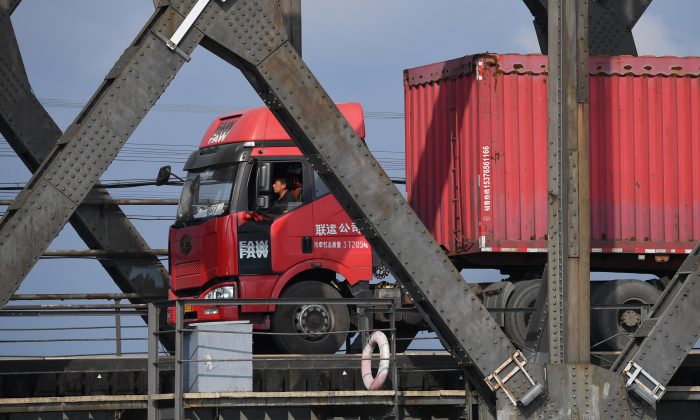Special to WorldTribune.com
 By Donald Kirk
By Donald Kirk
The U.S. has opened a bold new assault on North Korea’s nuclear-and-missile program with a one-two punch designating the North as a “state sponsor of terror” and then imposing new sanctions.
Analysts doubt if these measures will result in immediate capitulation of the regime of Kim Jong-Un to give up its nukes and missiles but hope that intensifying pressure may eventually leave him with no choice but to bow to the will of a broad array of nations demanding he stop threatening the world with death and destruction.
U.S. President Donald Trump’s decision to label the North as a “sponsor of terror” came nine years after George W. Bush, then the president, ordered removal of the North from the State Department’s list of nations cited for egregious violations of norms of international behavior.

The order from the U.S. Treasury Department sanctioning a 13 Chinese and North Korean companies and agencies and 20 vessels owned by North Korea added substance to the words of Trump as he denounced North Korea for spreading terror at home and abroad.
Treasury Secretary Steven Mnuchin said the latest sanctions shows “we are steadfast in our determination to maximize economic pressure to isolate it from outside sources of trade and revenue.”
The sanctions showed the determination of the U.S. to stifle trade across the Yalu or Amnok River between the Chinese city of Dandong and Sinuiju on the North Korean side. The sanctions specifically named four companies in Dandong that have been trading with North Korea despite UN sanctions that China’s President Xi Jinping has said he fully supports. The sanctions against North Korean vessels were intended to deprive the North of the means to conduct international trade on which the country depends.
The question, however, was whether the sanctions would simply spur Kim Jong-Un to order more missile tests, and possibly a seventh nuclear test, or whether he would eventually have to agree to join serious talks about giving up his nuclear program.
Critics contend that sanctions have not had significant impact on North Korean policies while Kim has engaged in more missile tests than were ordered by his father, Kim Jong-Il, or grandfather, the founder of the regime, Kim Il-Sung.
The counter-argument is that Kim will have to agree to return to six-party talks hosted by China, last held in Beijing in 2008. It was that year that Bush removed North Korea from the “terror” list in hopes of persuading North Korea to abide by agreements hammered out in six-party talks calling for a specific schedule for dismantling its nuclear program.
U.S. Secretary of State Rex Tillerson said the U.S. had expressed its willingness to negotiate with North Korea but had yet to receive a response from the North. Instead, the North Korean media has denounced President Trump in often insulting language to which Trump has responded in twitter messages insulting Kim Jong-Un.
More seriously, however, Trump during his recent swing to East Asian capitals sought to line up broad support for tough policies toward North Korea. He added to this campaign for international support in a telephone conversation Tuesday with Russia’s President Vladimir Putin, seeking to enlist his support for heightened pressure against the North.
Trump in restoring North Korea to the terror list criticized his predecessor, Barack Obama, for not having taken such a bold move during his eight years on office. One of his favorite comments is the U.S. should have re-designated North Korea as a sponsor of terror “a long time ago” – that was a dig against Obama’s policy of “strategic patience” in dealing with the North.
Trump and Tillerson have both said the time for such patience is over and now is the time to act decisively. Trump has hinted that he would consider a “military option,” possibly including a “preemptive strike” on its nuclear and missile facilities.
South Korea’s President Moon Jae-In has opposed any such action, which he believes could precipitate an attack by the North on South Korea, but he too has endorsed UN sanctions against the North. He and Trump appeared to have gotten along quite well during Trump’s recent visit – an occasion for him to call for strengthening South Korea’s armed forces.
The latest U.S. sanctions still leave open the question of how far Trump is willing to go to bring North Korea to the table. North Korean leaders and state media have said North Korea will not negotiate its nuclear program.
Trump said strong U.S. sanctions “supports our maximum pressure campaign to isolate the murderous regime” – a claim that no one would deny.
North Korea, however, deals commercially with China on a number of different levels, including trade across the river that is technically illegal. China, moreover, still pours oil into North Korea, fueling an economy that otherwise survives on far less efficient coal.
U.S. diplomats responsible for negotiating with the North Koreans in previous years were by and large supportive of strong sanctions – and also of calling North Korea a “terror state.”
Christopher Hill is the former U.S. diplomat who was instrumental in persuading first the secretary of state at the time, Condoleezza Rice, and then President Bush, to pull North Korea’s name from the “terror list.” Hill said North Korea had to be returned to the list in view of such acts of terror as the assassination of Kim Jong-Un’s half-brother, Kim Jong-Nam, in Kuala Lumpur International Airport and the torture and death of university student Otto Warmbier.
